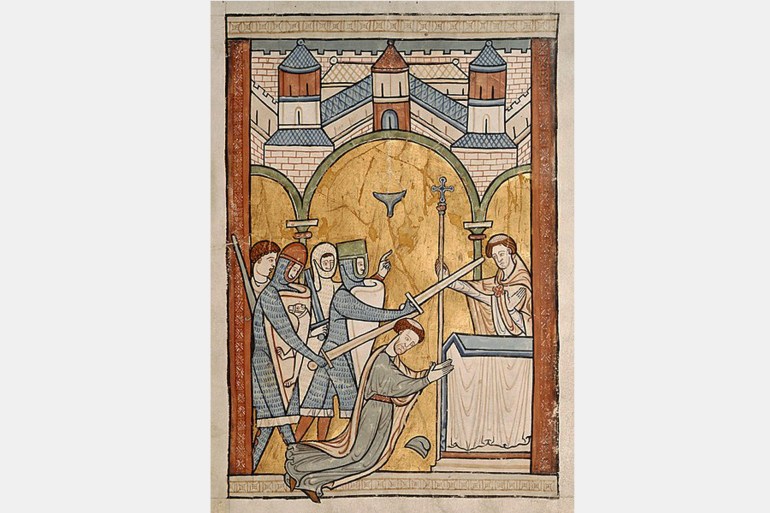A historical correspondence between the British King Henry II and the Pope of the Catholic Church in Rome, Alexander III, at the end of the 12th century, revealed a great and historical transformation that Britain was about to know, which is the entry into Islam and the conversion to a Muslim country, and the exit from Christianity.
This correspondence was revealed by the British history writer Claudia Gold in her investigative article on the pages of the BBC History magazine.
Historical sources also provide us with many impressive data about the relationship of Henry II, who ruled the country for many decades in the 12th century, with Arab and Islamic culture. Britain is already close to becoming a Muslim country?
early information
Henry II's first contact with Islamic civilization began when he was still a child when he read the writings of "Petros Alphonsi", who was a physician to his grandfather Henry I. For accuracy about the Prophet Muhammad, peace be upon him.
Henry II also studied the writings of "Peter the Venerable", who was abbot of a monastery in southern France, and formed a team to translate books from Arabic into Latin, and among these works was the Holy Qur'an, which was translated by the team of "Peter the Venerable".
Some historical writings suggest that Henry II got to know Arabic through a group of scholars who were familiar with Arab culture and its intellectual productions, especially in Sicily, Italy, Andalusia, and the Middle East.
Among the professors of Henry II was the famous linguist, Adelar of Bath, who had a great influence in his education, as the latter traveled for about 7 years to Sicily, Turkey and Antioch, in order to study Arabic thought, after which he was famous for being one of the first to translate Arabic works into Latin.
In a letter from Adelar to Henry, it appears that the latter requested knowledge of "the Arabs' opinion on the globe and the movements of the stars and planets," which shows King Henry II's interest in Arab productions in various fields.
Henry's admiration for Arabic continued with him until his accession to the throne, by his continuous request from diplomatic missions to bring him Arabic and translated texts, and when he wanted to express his love for "Rosamund Clifford" he built a palace for her in the style of Islamic architecture with fountains, gardens and Islamic decorations, before this palace was demolished. later.
Prince Noureddine's invitation
Spring of 1168 Henry II entered into a heated argument with Pope Alexander III, due to a disagreement between them over Thomas Becket, who had been appointed Archbishop of Britain in Rome by the Church in Rome.
The murder of Thomas Becket by the King's henchmen at Canterbury Cathedral in 1170 (websites)
Although Henry II appointed Beckett to this position and with the blessing of the Church, the Archbishop began to challenge the king’s influence and interfere in his competencies, which Henry did not accept, and when the crisis between them intensified, Beckett was forced to flee to France and seek protection from Louis VII.
What increased Henry II's anger was the Pope's standing next to the archbishop, which prompted him to send a message to the Pope bearing a clear threat that "he will accept the mistakes of Nur ad-Din and become an infidel, and this is easier for him than watching Beckett control the episcopate in Britain."
The meaning of this letter is that Henry threatens to accept the repeated invitations sent to him by Prince Nur al-Din Zangi, Prince of Aleppo, who was communicating with Henry II and calling him to Islam. in Rome.
This threat from Henry II to Pope Alexander III, to remove Becket from his position, does not appear to have brought about any change in the Church's position, especially after Beckett was found murdered two years after the letter by three of the King's knights.
It is not the first time that Henry threatens Pope Alexander, as he had previously threatened him to support his rival Victor IV to become the head of the Church, and indeed Henry succeeded at that time in extracting what he wanted from the Pope, who was afraid of his rival.
great influence
Henry II was not an ordinary king, but during his reign (1154-1189) he succeeded in extending his influence over a vast area that did not stop at the borders of the British island, but extended to large parts of Wales, the eastern half of Ireland and the western half of France, and he temporarily controlled over parts of Scotland.
His waving of embracing Islam means changing the doctrine of a large area of Europe towards Islam, which was not allowed by the Catholic Church, especially since the Crusades were at their peak at the time.
The British writer poses the question about what would have happened if Henry II had actually converted to Islam, as she asserts, "Henry's change of religion will require the collective conversion of all the peoples who were under his authority in the various regions of Europe, and the effect of the matter is enormous."

